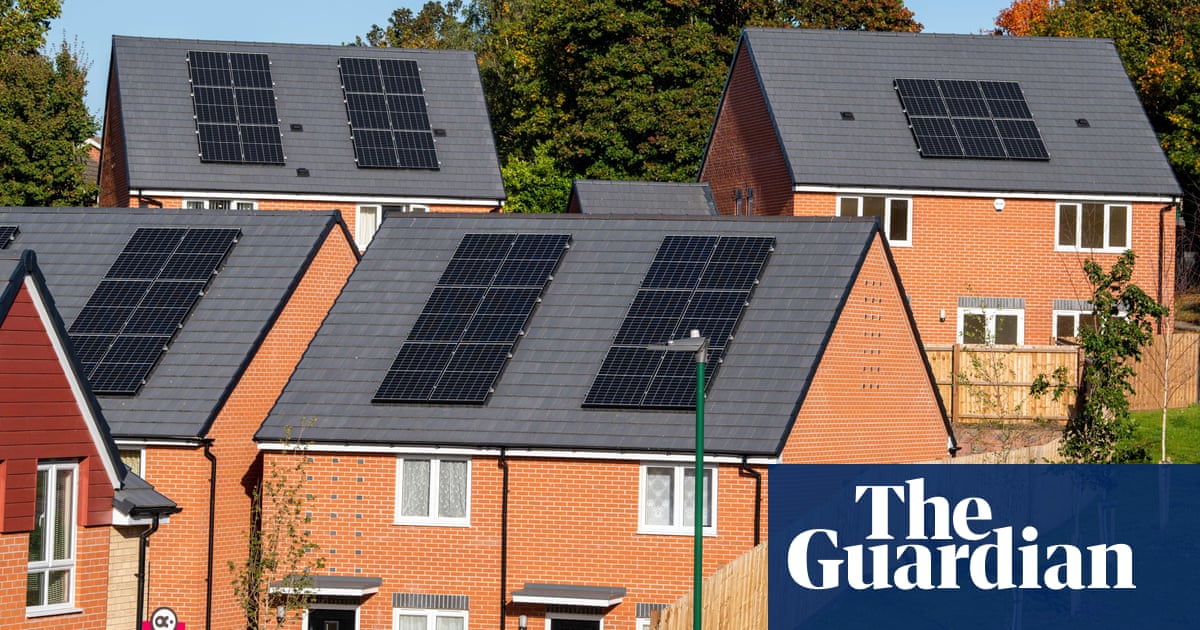Almost all new homes in England will be fitted withsolar panelsduring construction within two years, the government will announce after Keir Starmer rejected Tony Blair’s criticism of net zero policies.
Housebuilders will be legally required to install solar panels on the roofs of new properties by 2027 under the plans.
The policy is estimated to add between £3,000 and £4,000 to building a home but homeowners wouldsave more than £1,000 on their annual energy bills, according tothe Times.
Labour has set atarget of building 1.5m homesby the end of the parliament. The party has promised todecarbonise the electricity grid by 2030and cut household energy bills by £300 a year.
Ministers are also preparing to offer government-funded loans and grants for the installation of solar panels on existing homes.
The move is a sign that the government will press ahead with its net zero agenda afterStarmer rejected criticismsof climate policy from Blair.
In a high-profile interventiondays before the local elections, Blair said there needed to be a radical reset of “irrational” net zero policies that were “doomed to fail”.
The formerLabourprime minister argued that the public was being asked to make “financial sacrifices and changes in lifestyle” that would have “minimal” effect on global emissions. He said the drive to phase out fossil fuels in the short term was “doomed to fail” because their production and demand was rising.
His remarks angered government figures andtriggered a response from senior No 10 officials, who called the Tony Blair Institute for Global Change (TBI) and urged it to address the fallout. The TBI issued a clarifying statement on Wednesday morning saying it believed the government’s net zero policy was “the right one”.
Blair’s remarks were interpreted as an attack on Starmer’s policy agendaafter the prime minister said last weekthat tackling the climate crisis and bolstering energy security were “in the DNA of my government”.
Unite, the UK’s second biggest union, has echoed Blair’s criticism of climate policies. Its general secretary, Sharon Graham, said workers should not be thrown “on the scrapheap” in the pursuit of net zero.
Speaking to Times Radio on Thursday, Graham pointed to thedevelopments at Grangemouth oil refineryand said: “The problem is that the jobs part of this is not being discussed.” The refinery stopped processing crude oil this week.
Asked whether she agreed with Blair’s comments this week, Graham said: “Workers want net zero, my members have no problem with net zero. The problem that we’ve got is that there is no investment currently about how we get to that and also secure jobs.
“There hasn’t been one single thing done so far that I can see in terms of investments on wind manufacture, in terms of investments into areas like sustainable air fuel … all of those things have not happened, and you cannot just plough on regardless and throw all of these workers on the scrapheap.”
Campaigners have welcomed the news that the government is going to mandate solar panels on new homes.
Lily-Rose Ellis, Greenpeace UK’s climate campaigner, said: “For too long we’ve wasted the free energy that falls on the roofs of houses every single day. Now, people living in new-build homes will save hundreds of pounds every year on their energy bills, thanks to this commonsense decision from the government.”
A government spokesperson said: “We have always been clear that we want solar panels on as many new homes as possible because they are a vital technology to help cut bills for families, boost our national energy security and help deliver net zero.
“Through theFuture Homes Standardwe plan to maximise the installation of solar panels on new homes as part of our ambition to ensure all new homes are energy efficient, and will set out final plans in due course.”
